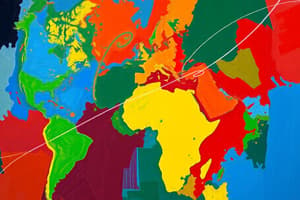Podcast
Questions and Answers
What does geopolitical economy primarily examine?
What does geopolitical economy primarily examine?
- The impact of military strategies on trade
- The effects of cultural exchanges on global economies
- The historical development of international laws
- The relationship between economic and political factors (correct)
Which theoretical framework emphasizes state power and national interests in shaping economic policies?
Which theoretical framework emphasizes state power and national interests in shaping economic policies?
- Socialism
- Realism (correct)
- Liberalism
- Constructivism
What role do multinational corporations (MNCs) play in geopolitical economy?
What role do multinational corporations (MNCs) play in geopolitical economy?
- Influencing local economies and political landscapes (correct)
- Governing international economic relations
- Colonizing foreign markets
- Implementing government policies
Which of the following best describes 'soft power'?
Which of the following best describes 'soft power'?
What is one consequence of increased globalization?
What is one consequence of increased globalization?
What do economic sanctions aim to achieve?
What do economic sanctions aim to achieve?
Which issue pertains to geopolitical implications related to environmental policies?
Which issue pertains to geopolitical implications related to environmental policies?
What is the primary focus of political economy?
What is the primary focus of political economy?
Flashcards
Geopolitics
Geopolitics
The study of how geographical factors influence international politics and relations.
Political Economy
Political Economy
The analysis of the relationship between politics and economics, examining how political institutions, processes, and actors influence economic policies and outcomes.
Realism in Geopolitical Economy
Realism in Geopolitical Economy
A theoretical framework emphasizing the role of state power and national interests, with states acting in their self-interest to maximize their power and security.
Liberalism in Geopolitical Economy
Liberalism in Geopolitical Economy
Signup and view all the flashcards
Constructivism in Geopolitical Economy
Constructivism in Geopolitical Economy
Signup and view all the flashcards
Soft Power
Soft Power
Signup and view all the flashcards
Hard Power
Hard Power
Signup and view all the flashcards
Economic Sanctions
Economic Sanctions
Signup and view all the flashcards
Study Notes
Geopolitical Economy (Geo Pol Eco) Study Notes
-
Definition: Geopolitical economy refers to the interplay between economic and political factors in global relations, focusing on how geographical and economic contexts influence power dynamics.
-
Key Components:
- Geopolitics: The study of how geographical factors influence international politics and relations.
- Political Economy: Analysis of the relationship between politics and economics, examining how political institutions, processes, and actors influence economic policies and outcomes.
-
Theoretical Frameworks:
- Realism: Emphasizes the role of state power and national interests in shaping economic policies and actions.
- Liberalism: Focuses on cooperation and interdependence among states, promoting free trade and economic integration.
- Constructivism: Highlights the importance of social constructs, ideologies, and identities in shaping geopolitical and economic relations.
-
Globalization:
- Increases interdependence among countries.
- Facilitates the movement of goods, services, capital, and labor.
- Creates new geopolitical dynamics, with emerging economies gaining influence.
-
Key Players:
- States: National governments that implement policies influencing economic relations and power dynamics.
- International Organizations: Institutions like the IMF, World Bank, and WTO that govern international economic relations.
- Multinational Corporations (MNCs): Companies that operate across borders, impacting local economies and political landscapes.
-
Important Concepts:
- Economic Sanctions: Tools used by states to influence the behavior of other states by restricting trade and financial transactions.
- Soft Power: The ability to influence others through cultural or ideological appeal rather than coercion.
- Hard Power: Use of military force or economic coercion to achieve political goals.
-
Current Issues:
- Trade Wars: Conflicts between nations over tariffs and trade barriers.
- Climate Change: Geopolitical implications of environmental policies and resource scarcity.
- Technological Competition: Rivalry over technological advancements and cybersecurity between nations.
-
Case Studies:
- US-China Relations: Examines the economic competition and strategic tensions between the two largest economies.
- European Union: The political and economic integration of European states and its impact on global relations.
- Middle East Conflicts: The intersection of resources (oil) and geopolitics in regional stability.
-
Future Trends:
- Shift towards multipolarity with emerging powers gaining influence.
- Increasing importance of technology and innovation in geopolitical strategies.
- Greater emphasis on sustainable development and global governance to address transnational challenges.
Geopolitical Economy Overview
- Geopolitical economy examines the relationship between economic and political factors globally, influenced by geographical contexts and power dynamics.
Key Components
- Geopolitics: Analyzes how geographical elements shape international politics and relations.
- Political Economy: Explores how political institutions and actors affect economic policies and outcomes.
Theoretical Frameworks
- Realism: Prioritizes state power and national interests in determining economic actions.
- Liberalism: Advocates for cooperation and interdependence among states, promoting free trade.
- Constructivism: Focuses on social constructs, ideologies, and identities that shape geopolitical and economic connections.
Globalization
- Fosters increasing interdependence among nations through the exchange of goods, services, capital, and labor.
- Alters geopolitical landscapes, giving rise to newfound influence among emerging economies.
Key Players
- States: National governments responsible for shaping economic relations and influencing global power dynamics.
- International Organizations: Entities like the IMF, World Bank, and WTO that regulate international economic interactions.
- Multinational Corporations (MNCs): Companies that transcend national borders, affecting local economies and political environments.
Important Concepts
- Economic Sanctions: Mechanisms used by states to manipulate the conduct of other nations through trade restrictions.
- Soft Power: The capacity to sway others through cultural or ideological influence, as opposed to force.
- Hard Power: Utilizes military might or economic coercion to fulfill political objectives.
Current Issues
- Trade Wars: Ongoing disputes over tariffs and trade barriers between nations.
- Climate Change: Investigates the geopolitical ramifications of environmental policies and resource allocation.
- Technological Competition: Examines national rivalries surrounding technological advancements and cybersecurity.
Case Studies
- US-China Relations: Analyzes economic rivalry and strategic challenges facing the world's two largest economies.
- European Union: Evaluates the political and economic integration of EU member states and its global impact.
- Middle East Conflicts: Investigates the links between resource distribution (particularly oil) and geopolitical stability in the region.
Future Trends
- Anticipation of a multipolar world as emerging powers gain increased clout.
- Heightened focus on technology and innovation as critical components of geopolitical strategy.
- Growing urgency for sustainable development and enhanced global governance to tackle cross-border challenges.
Studying That Suits You
Use AI to generate personalized quizzes and flashcards to suit your learning preferences.




